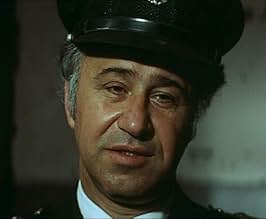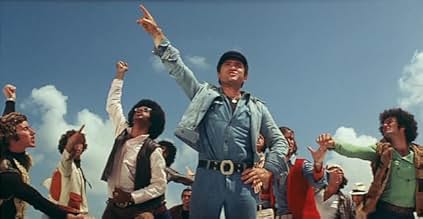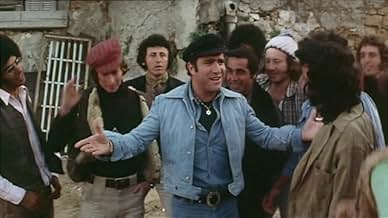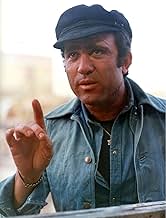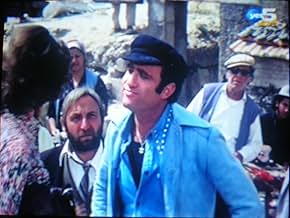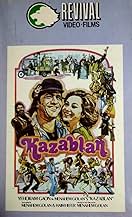An embittered gang leader seeks the respect of his neighbors and the love of a young woman.An embittered gang leader seeks the respect of his neighbors and the love of a young woman.An embittered gang leader seeks the respect of his neighbors and the love of a young woman.
- Awards
- 2 nominations
Ya'ackov Ben-Sira
- Mr. Spiegel
- (as Yaacov Ben-Sira)
Storyline
Did you know
- TriviaYehoram Gaon reprises his roll from the original 1966 stage musical.
- Alternate versionsTwo versions were filmed: one in Hebrew, the other in English.
- ConnectionsFeatured in A History of Israeli Cinema (2009)
Featured review
"Kazablan" is, simply put, a film that runs more closely akin to a dream sequence or rapid visual/audio/sensory montage than a linear-constructed primarily plot-driven piece. In some respects, the camera's tendency to wander almost randomly to various individuals, locales, and scenarios somewhat resembles a Monty Python "The Meaning of Life" form. (Although certainly no comparison, beyond the superficial visual image, is being promoted.)
To differentiate the quality of performances of the actors is irrelevant in a film with "Kazablan"'s qualities; certainly, the acting is respectable, but the characters are nearly all background to the foreground of the Israeli surroundings' atmosphere. (More specifically, very noticeably 1970's Israel.) In addition, the mood is sustained very well throughout the picture.
The intriguing question is simply, What is this film truly about? Is it a coming-of-age story for a young man disenchanted with his post-military service life? Or is it an anti-prejudice statement, albeit a simplistic and superficial one? Ultimately, as discussed earlier, such plot contrivences (to the credit of the filmmakers; they certainly made the correct decision not to overplay certain obvious stances the movie does indeed adopt), are unimportant in "Kazablan."
Once again, it is a "mood" film, or a film abundant with atmosphere -- and it should be treated as such. Any attempt to impart a diagectic quality on the part of the viewer is a clear error. ("Kazablan" is not, however, a slice-of-life picture. For an excellent example of such a film [and also to compare the overt differences between a slice-of-life and a mood movie], view "Nobody's Fool," the 1994 piece starring Paul Newman, Melanie Griffith, and Bruce Willis.) Simply watch Kazablan with one objective: Relaxation.
To differentiate the quality of performances of the actors is irrelevant in a film with "Kazablan"'s qualities; certainly, the acting is respectable, but the characters are nearly all background to the foreground of the Israeli surroundings' atmosphere. (More specifically, very noticeably 1970's Israel.) In addition, the mood is sustained very well throughout the picture.
The intriguing question is simply, What is this film truly about? Is it a coming-of-age story for a young man disenchanted with his post-military service life? Or is it an anti-prejudice statement, albeit a simplistic and superficial one? Ultimately, as discussed earlier, such plot contrivences (to the credit of the filmmakers; they certainly made the correct decision not to overplay certain obvious stances the movie does indeed adopt), are unimportant in "Kazablan."
Once again, it is a "mood" film, or a film abundant with atmosphere -- and it should be treated as such. Any attempt to impart a diagectic quality on the part of the viewer is a clear error. ("Kazablan" is not, however, a slice-of-life picture. For an excellent example of such a film [and also to compare the overt differences between a slice-of-life and a mood movie], view "Nobody's Fool," the 1994 piece starring Paul Newman, Melanie Griffith, and Bruce Willis.) Simply watch Kazablan with one objective: Relaxation.
Details
Contribute to this page
Suggest an edit or add missing content


